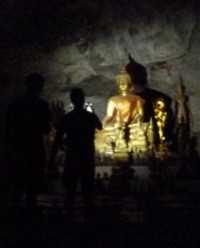The Lao People's Democratic Republic is a communist country, like China to the North and Vietnam with which it shares its Eastern border.
And like the bordering communist countries, the government has embraced limited private ownership and free market capitalism, in theory. But there remain powerful vested interests, and residual pockets of political power, particularly in the agricultural sector, and corruption is a significant issue.
During the past decade tourism has become an important source of income and is now generating around a third of the Nation's domestic product. Tourism is centred on Luang Prabang and to a lesser extent the Plane of Jars and the capital, Vientiane.
To quote from Wikipedia:
Laos traces its history to the kingdom of Lan Xang, which existed from the 14th to the 18th century when it split into three separate kingdoms.
In 1893, it became a French protectorate, with the three kingdoms, Luang Phrabang, Vientiane and Champasak, uniting to form what is now known as Laos.
It briefly gained independence in 1945 after Japanese occupation, but returned to French rule until it was granted autonomy in 1949.
Laos became independent in 1953, with a constitutional monarchy under Sisavang Vong.
Shortly after independence, a long civil war ended the monarchy, when the Communist Pathet Lao movement came to power in 1975.
Laos is famously one of the few large land-locked countries in the world.
Economically it is poor, on a par with Cambodia to the South, but economic growth is in the region of 8% pa. While 75% of the population are poor farmers, services (mostly tourism) and industry now account for over 60% of GDP and growing.
Minerals and hydroelectricity are important resources that are expected to accelerate industrial development. Laos sells its excess electricity to neighbouring countries and has substantial commercial gold and copper deposits already in commercial production. Potential commercial deposits of tin, aluminium and coal have been identified that may provide future economic growth. A number of Australian mining companies are active in Laos.
To generate additional hydroelectric power the government is presently constructing the controversial Xayaburi Dam on the Mekong River in Northern Laos. As the Mekong downstream is also an important resource to Thailand, Cambodia and Vietnam there have been international repercussions. These are in addition to the usual environmental outcry that results from any large dam construction.
For logistical and time reasons we did not go to the heavily bombed and heavily restricted Plane of Jars. But there is an excellent exhibit in the Lao National Museum in Vientiane providing background and I commend the Wikipedia article on this amazing iron age burial/cremation site to you. Three metre diameter solid stone crematory jars beat anything at Forest Lawn.
Lao National Museum -
Hindu objects removed by the Buddhists and some interesting Bronze and Iron Age exhibits - including the Jars

